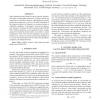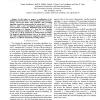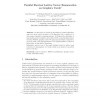276
click to vote
C3S2E
2011
ACM
14 years 5 months ago
2011
ACM
The LLL algorithm is a well-known and widely used lattice basis reduction algorithm. In many applications, its speed is critical. Parallel computing can improve speed. However, th...
107
click to vote
ICASSP
2011
IEEE
14 years 5 months ago
2011
IEEE
Since optimum diversity behavior can be achieved, equalization based on lattice basis reduction is of special interest for transmission over MIMO channels. Although the per-symbol...
119
click to vote
ISITA
2010
15 years 2 days ago
2010
In this paper we propose a modication of the Hopeld neural networks for vector precoding, based on Lenstra, Lenstra, and Lov`asz lattice basis reduction. This precoding algorithm c...
127
click to vote
JOC
2002
15 years 1 months ago
2002
We present a polynomial-time algorithm that provably recovers the signer's secret DSA key when a few bits of the random nonces k (used at each signature generation) are known ...
132
Voted
EUROPAR
2010
Springer
15 years 3 months ago
2010
Springer
Abstract. Lattice basis reduction is the problem of finding short vectors in lattices. The security of lattice based cryptosystems is based on the hardness of lattice reduction. Fu...
118
Voted
FCT
1991
Springer
15 years 5 months ago
1991
Springer
We report on improved practical algorithms for lattice basis reduction. We propose a practical oating point version of the L3{algorithm of Lenstra, Lenstra, Lovasz (1982). We pres...
108
click to vote
ARITH
2007
IEEE
15 years 6 months ago
2007
IEEE
We address the problem of computing a good floating-point-coefficient polynomial approximation to a function, with respect to the supremum norm. This is a key step in most process...
135
Voted
ISSAC
1992
Springer
15 years 6 months ago
1992
Springer
Abstract. Lattice basis reduction is an important problem in geometry of numbers with applications in combinatorial optimization, computer algebra, and cryptography. The well-known...
177
Voted
GLOBECOM
2006
IEEE
15 years 8 months ago
2006
IEEE
— Lattice basis reduction is a powerful technique that enables a hard-output detector for a multiple-input multiple-output channel to approach maximum-likelihood performance with...
125
Voted
AFRICACRYPT
2010
Springer
15 years 9 months ago
2010
Springer
In this paper we present an algorithm for parallel exhaustive search for short vectors in lattices. This algorithm can be applied to a wide range of parallel computing systems. To ...



